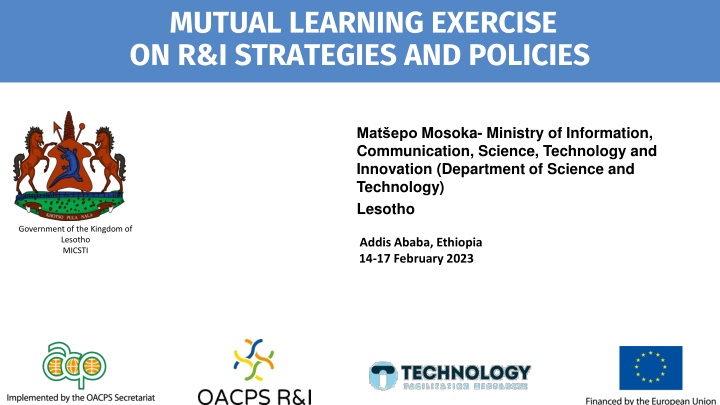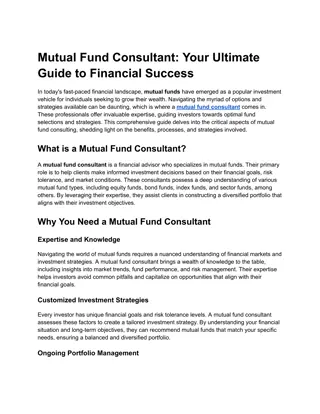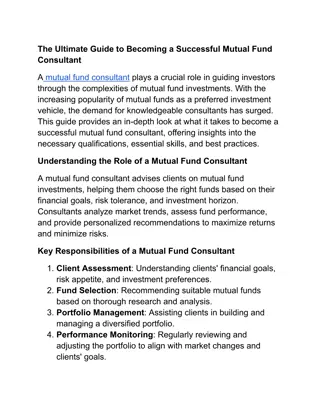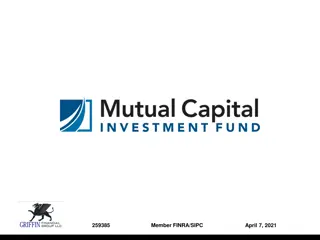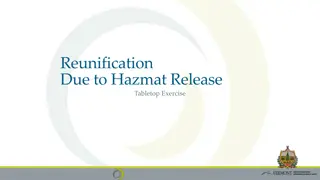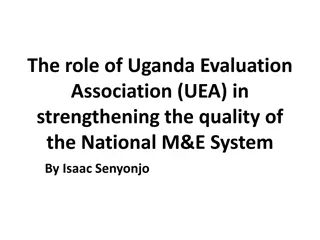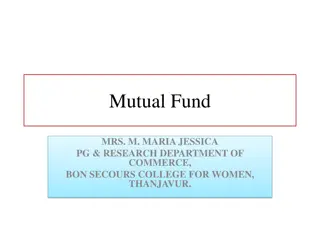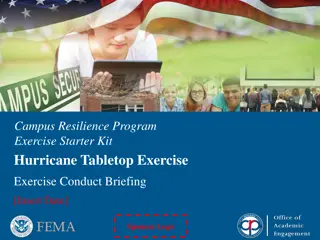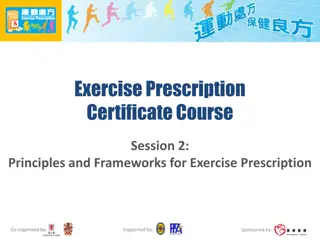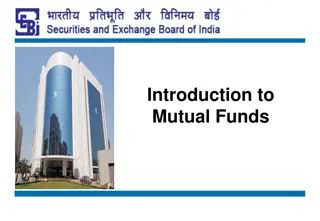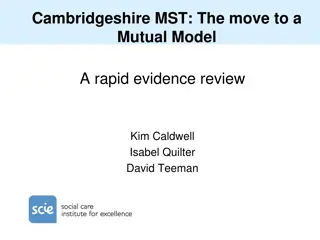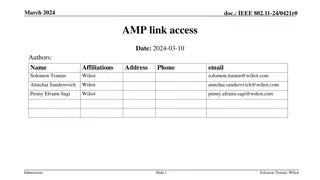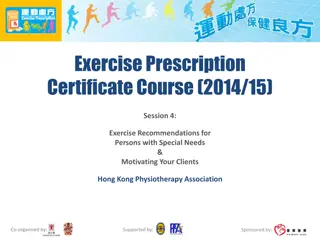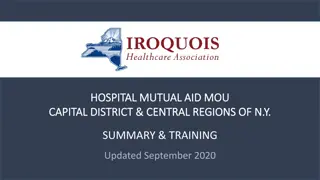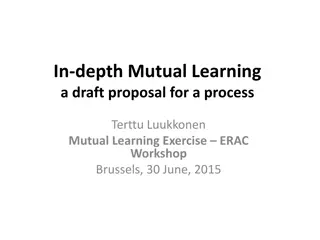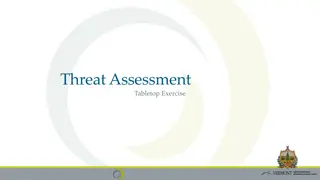Mutual Learning Exercise on R&I Strategies and Policies
In this session, the Ministry of Information, Communication, Science, Technology, and Innovation from Lesotho discusses the development challenges and policies related to science and technology. The presentation covers various aspects including economic growth, poverty, inequality, and the country's R&I ecosystem analysis such as SWOT, strengths, weaknesses, opportunities, and threats.
Download Presentation

Please find below an Image/Link to download the presentation.
The content on the website is provided AS IS for your information and personal use only. It may not be sold, licensed, or shared on other websites without obtaining consent from the author.If you encounter any issues during the download, it is possible that the publisher has removed the file from their server.
You are allowed to download the files provided on this website for personal or commercial use, subject to the condition that they are used lawfully. All files are the property of their respective owners.
The content on the website is provided AS IS for your information and personal use only. It may not be sold, licensed, or shared on other websites without obtaining consent from the author.
E N D
Presentation Transcript
MUTUAL LEARNING EXERCISE ON R&I STRATEGIES AND POLICIES Mat epo Mosoka- Ministry of Information, Communication, Science, Technology and Innovation (Department of Science and Technology) Lesotho Government of the Kingdom of Lesotho MICSTI Addis Ababa, Ethiopia 14-17 February 2023
Slide 1: Background and country context Slow Economic Growth Persistent Poverty & Growing Inequality Consensus view derived from stakeholder consultation and engagement Aimed at promoting the utilization of S&T as tools for economic development Development Challenges Unemployment Human Development Lesotho Science and Technology Policy 2006-2011 Science, Technology and Innovation Policy Review 2010 An Implementation Strategy for Lesotho Science and Technology Policy Science and Technology Commission Lesotho innovation Trust Fund Science and Technology Act 2021 National Strategic Development Plan II 2018-2023 - R&I Policy needed for clear priorities in the R&I Ecosystem (R&I Policy 2021 Awaiting cabinet approval) National Innovation Agency Enactment of S&T Policy Development of R&I Policy Implementation of Key Priority Area Interventions The results' chain The planning, monitoring and evaluation cycle (management cycle) The M&E plan Results based Monitoring and Evaluation Framework
Slide 3: R&I Ecosystem Analysis SWOT Analysis Better Conditions for starting businesses and support of innovative start-ups increased number of scientific publications and international collaboration in publications NUL as the main channel of Knowledge dissemination and open communication with companies for knowledge transfer The population of Lesotho is relatively young, literate and with good command of English S Insufficient entrepreneurial activity Limited research activity due to low investment in research Interaction between HEIs and companies is limited and fragmented Lack of statistics regarding research and innovation Small market for new technologies and innovative products Only 1% of companies fund research W Strengths Weaknesses Opportunities Threats duty-free access for goods to major world markets (United States through AGOA,European Union s Generalised System of Preferences (EU GSP). young age of the population may translate to an increase of the working population that could also boost the currently low research capacity. Low carbon footprint continues to offer the country opportunities to develop a green economy sustainably, Political volatility would affect the ability of the governance system to coordinate actions across policy domains such as research, industrial education and agricultural policies Government expenditure is mainly dependent on the volatile SACU transfers Increasing temperatures and lower levels of rainfall due to climate change have a significant negative impact on agriculture and food International competition is intensified by other low-cost countries pressing for an increase in productivity and product differentiation by exploiting the possibilities offered by research and innovation T O
Slide 4: R&I Ecosystem Analysis - II P E S T L E Factors that can hinder transformation Government investing less in R&D i.e 0.05% of GDP Low financing of MSMEs Lack o tax rebates and tax holidays for businesses under incubation Attitudes towards policy interventions e,g commercialization of IK Silo mentalities (lack of integrated systems) Lack of skills for new technology Absence of a national coordinating body for the national system of innovation Climate Change Natural disasters, Energy inefficiency, food insecurity, Factors that can foster transformation Funding instruments for R&I Revision of tax laws to inclide tax rebates/hoidays for technology incubatees Promoting public understanding Promoting collaboration Skills development targeting new developments in technology S&T Act 2021 (Innovation fund, Act of parliament to establish the NIA Smart agriculture, renewable energy sources, early warning systems, application of emerging technologies
Slide 5: Transformation and Development Impacts Emerging applications in agriculture, health, ICT, manufacturing and green economy Tertiary education and workforce training programmes Inclusion and socioeconomic equality and Equity IKS, IP Protection and access to R&I information Business Regulatory environment and access to incentives Collaborative Scientific R&D SDG 1:End poverty in all its forms everywhere SDG 2: End hunger, achieve food security and improved nutrition and promote sustainable agriculture SDG 3: Ensure healthy lives and promote well-being for all at all age SDG 4: Ensure inclusive and equitable quality education and promote lifelong learning opportunities for all SDG 5: Achieve gender equality and empower all women and girls SDG 7: Ensure access to affordable, reliable, sustainable and modern energy for all SDG 9: Build resilient infrastructure, promote inclusive and sustainable industrialization and foster innovation SDG 10: Reduce inequality within and among countries SDG 11: Make cities and human settlements inclusive, safe, resilient and sustainable SDG 13: Take urgent action to combat climate change and its impact SDG 17: Strengthen the means of implementation and revitalize the Global Partnership for Sustainable Development
Slide 6: Conclusion Slide 6: Conclusion insights for MLE MLE insights for Secure political buy-in. Policies need to be backed by supporting legal frameworks Prioritize the integration of an effective system for the implementation, monitoring and evaluation of national R&I Policies
